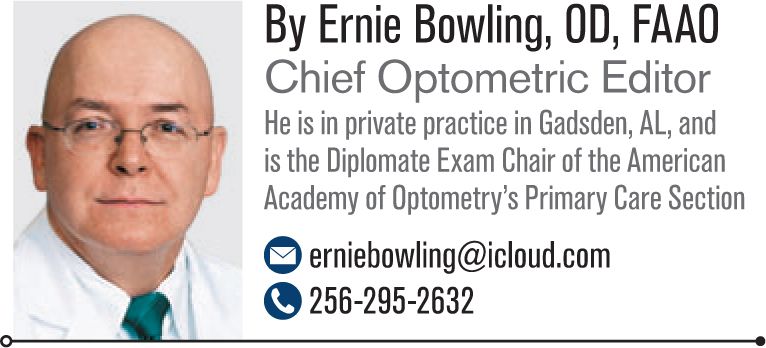SC vs. Opternative: An example of what makes optometry great
Much has been written about Opternative, and I will not rehash what the product is and what it purports to do. I will say the product presents a clear and present danger to the eye health of the unsuspecting public. We can argue the merits of disruptive technology, but the bottom line is the product as currently marketed as an “eye exam” is a public health threat.

Much has been written about Opternative, and I will not rehash what the product is and what it purports to do. I will say the product presents a clear and present danger to the eye health of the unsuspecting public. We can argue the merits of disruptive technology, but the bottom line is the product as currently marketed as an âeye examâ is a public health threat. This has been recognized because the product has been banned in seven states to date.
The most recent is South Carolina, and the mechanics of how the South Carolina Optometric Physicians Association (SCOPA) had to overcome the ignorance and arrogance of its governor is a model for all optometry.
More from Dr. Bowling: Strengths, weaknesses, opportunties, and threats to optometry
The bill, R178, S1016, âThe Consumer Eye Care Protection Act,â was first introduced in January 2016. It states that âa prescription for spectacles or contact lenses may not be based solely on the refractive eye error of the human eye or be generated by a kiosk.â1 The bill initially passed 100-1 in the House and 40-0 in the Senate. Yet South Carolina Governor Nikki S. Halley vetoed the legislation on May 16, stating, âI am vetoing this bill because it uses health practice mandates to stifle competition for the benefit of a single industry, effectively banning eye care kiosks statewide⦠a small group of eye care professionals is seeking to block new technologies that expand low-cost access to vision correction services.â
I wouldnât consider SCOPA nor the AOA, who have been quite vocal about this technology, to be a âsmall group.â As well as the fact the legislation passed so readily. Gov. Halley was obviously uninformed or simply chose to ignore the wishes of her constituents. No matter. Her veto was overturned by an overwhelming vote from the state legislature. The Senate voted 39-3, while the House voted 98-1 to override the veto. South Carolina joins Georgia and Indiana as states that have banned online eye exam technology like Opternative. Opternative has now ceased operations in South Carolina.2
Related: Will optometry's fear of disruptive technology backfire?
This is what organized optometry looks like at its best. It took the grassroots efforts of South Carolina ODs contacting their legislators as well as the ceaseless work of SCOPA and AOA. Johnson & Johnson even lent its support by reaching out to SC legislators.
Our colleaguesâ efforts in South Carolina provide a template for other states in what will surely be an ongoing, protracted battle with companies who choose to put profits before patient health. To allow such a bill to pass in any state will result in a cancer-like spread which cannot be tolerated.
References
1. Pai A. South Carolina Governor vetoes bill that sought to ban online eye exams. Mobile Health News. 18 May 2016. Available at: http://mobihealthnews.com/content/south-carolina-governor-vetoes-bill-sought-ban-online-eye-exams. Accessed June 9, 2016.
2. Dallke J. Lawmakers override governorâs veto. Chicagoinno.com. 20 May 2016. Available at: http://chicagoinno.streetwise.co/2016/05/20/opternative-pulls-out-of-sc-after-lawmakers-override-governors-veto/. Accessed 6/9/2016.
Newsletter
Want more insights like this? Subscribe to Optometry Times and get clinical pearls and practice tips delivered straight to your inbox.